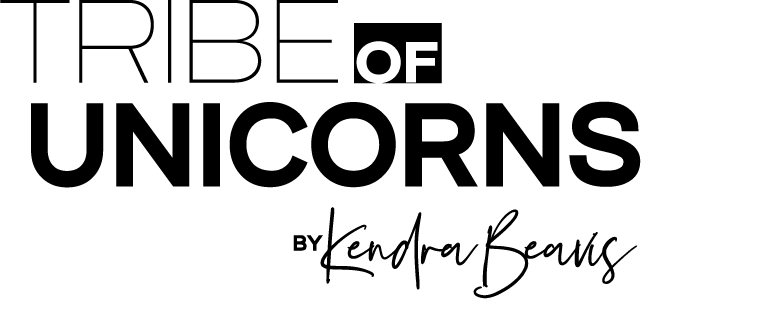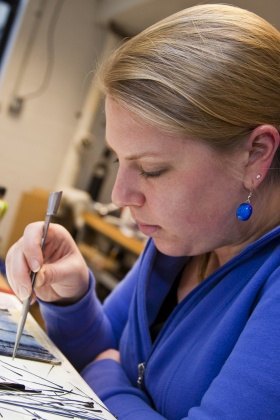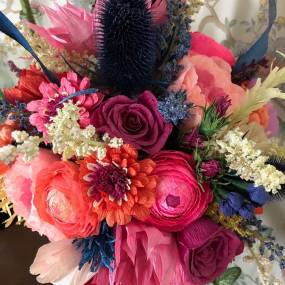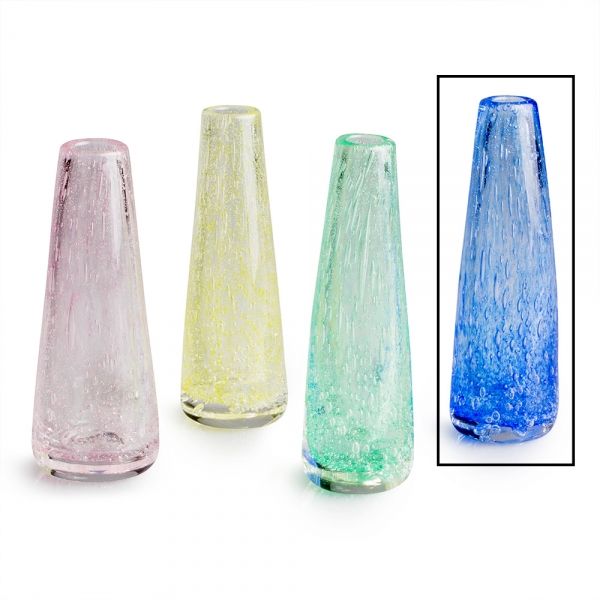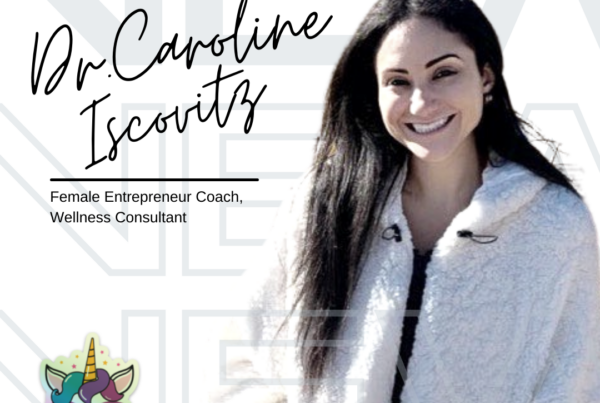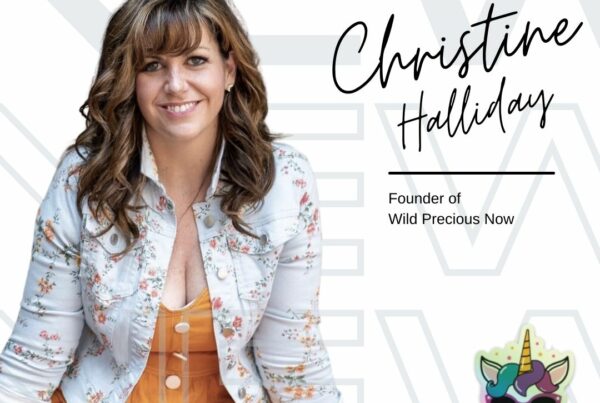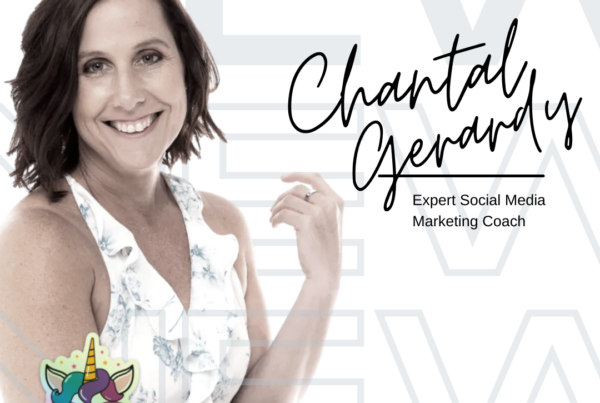Glass Blowing Unicorn
Episode 3: Janet Dalecki
”Because just the way that glass is— and you can't touch it with your hands ... like you can't really like stop and like put it down and come back with you have to make that piece right then and there ... and that's it. So with those limitations and then with it dripping and moving and you know gravity and everything. You're using your two hands and they are doing different things. And there's so much that is going on that I do wish that that process was more public because it is fascinating.
Janet Dalecki StadnickiGlassblower
Hello, everyone. Welcome back to tribe of unicorns. Today I am sitting with a good friend of mine, Janet Galecki, who is a glass artist up in northern New York. Welcome, Janet.
Hi, thanks for having me.
So I’ve known Janet for like ever. We grew up together and she is hands down one of the most creative people I’ve ever met. She can take something completely ordinary and just elevated to the most extraordinary thing you’ve ever seen. So plus, her career is absolutely the coolest thing. I don’t know any one else that manipulates glass and the way she does, whether it’s stained glass or mosaics or blown glass, it’s pretty incredible. So I was psyched to get her on to an episode of tribe of unicorns to talk about her career path and what she does and share that with all of you guys.
Thanks. That’s so nice.
So where are you? So let me also preface this with we are still recording. We’re recording this what’s today June 17 17th.
So, I know from New York, we’re kind of just coming out of our quarantine with Coronavirus. And so it’s definitely something I want to talk about in this conversation as well, kind of how that’s affected your industry and your process and your workflow. But let’s start with how the heck did you get into this?
Yeah, um, I just remember that. My family took a trip up to Corning when I was about 14. And it was like just one of those fascinating things. We went to the Corning Museum of Glass and I remember watching a video on how to do a glassblowing technique and we just my dad and I both were kind of mesmerized thought it was just the coolest thing. But I never thought I would do anything like that. But fast forward to college and when I went to the art school, I knew I just wasn’t meant to, like sit in an office. And I knew I wanted to do art of some kind and they had a really great glassblowing program. And it was something that I just figured there is no way I can not try this. So and coincidentally my dad who got into stained glass when I was somewhere as a kid, somewhere in my childhood, he opened a stained glass store so I still didn’t think of it as the same I thought I was still venturing out on my own and being very unique, but um, you know, we definitely have some, some techniques that crossover and some a lot of glass that we kind of share. So it is really pretty, pretty cool that that he does glass in his own way and I do glass and we kind of cross paths at times is really cool. sort of not really a family business but yeah, it’s not but it is. It’s like I thought it was so separate but then really it’s not that all that different. So, yeah.
So you went to college and you studied how to be a glassblower.
Where did your after you graduated? Like, how did you navigate that career path?
Yeah, I found a studio in Massachusetts in the Berkshires that they were looking for. I mean, I interned So, I mean, I, I lived in a trailer, or an RV, I guess you’d call it that was parked in the parking lot of the studio for three months and would blow glass and this was like a summer internship. So that was the first sort of dive into the actual Like career, I guess you could say where, you know, I actually worked in the industry. So, yeah. And I was young, you know, in my early 20s. And so, it was a, it was fun, and I got to learn a lot. So that was, that was really great. And I would, you know, I’d love to like four in the morning, sometimes. It’s like, stuff that I, you know, I don’t have the opportunity to do now. So it was a good time for it, though.
Is glassblowing something that I would imagine you? Obviously, you have the choice to be a freelance artist versus are there like full time positions? Is that a pretty easy thing to find? Or is that more specific to areas of the US?
Yeah, I would say definitely, you have to make sure you find an area that, you know, has studios and you know, hopefully more than one just so you have you’re surrounded by it. There are definitely some areas that are More, you know, prone to having more glass than others. But um, oh, it’s pretty common to find I think private studios around but as far as finding a job yeah, it was, it was a little challenging. But um, and that’s pretty much how I ended up in Corning, New York because there’s a museum there were several studios at the time that I moved up here. But it is a little bit of a dying art. I mean, there’s definitely only one studio left on the street that I used to work on. Whereas when I moved there to work in Corning, there were three. So yeah, it’s certainly a unique thing of some kind. Are you? So sorry, go ahead. No, no, go ahead.
I was just gonna say do you see like there are other areas of the US that have like sort of a more, more opportunity that like, would you consider going or or do you think it’s just kind of cool to watch what other people are doing another areas
I like I was saying kind of, there’s definitely cities that are more prone to it like Seattle has a museum of glass. Corning has a museum of glass. There are parts of you know, there are other cities that are more art forward than others like areas and like Texas or Oregon. So yeah, definitely. I think if you’re in glass, the glass blowing industry, you you’re aware of those other areas, they kind of pop up. So it’s easy to kind of, it’s a small world, I would say. So it’s kind of easy to keep in the loop, but at the same time, it just depends on the way that you want to be connected. Like, if you’re, if you’re doing your own thing you may not be as aware as if you worked for like when I worked at the Corning Museum of Glass. You know, I felt like it was really in the The middle, it was kind of one of the mechas of glassblowing. So you, you’re always seeing artists come there. So it’s, I think, depending on how you were in involved, you’re definitely going to see
more artists from certain areas or you’re going to maybe like, you know, be a little bit less in the, in the loop.
So, right, you just kind of depends how your how you work and how involved you want to be.
So after your internship, what was your next move after that?
I lived in New York City for about a year. So I was living in Manhattan and then commuting to Queens and I worked for a sunglass company that also did glassblowing for Tiffany’s. So we we made some things for their house where lines sometimes how cool, but it was more probably more of a sunglass restaurant. Studio as well. So even deliver everything.
And then what was your move after that?
From there, I got a job in Corning at a private studio. And I was working to make their production line so it was last Angel glass was the name of the studio. And yeah, I would love glass seven days or five days a week. Yes. So and then it was nice because I got to make my own work on the side use the studio as well.
I would imagine that’s probably a huge challenge is finding and getting studio time
it is at the when I was working you know full time making glass and then you’re so like hot and tired. That finding time to blow glass in your spare time is like just physically, you know, it’s pretty tiring. But, but living in Corning. I it’s not that hard to find because there’s, it’s, you know, this is definitely the great place to blow glass. There’s definitely a lot of rental availability.
That’s cool. So, um, would you call yourself a freelance artist or
now I would, yeah, I, I’ve worked for studios, and that was great. But, uh, at this point, you know, I’m getting a little bit older and to sacrifice your body for other people’s work, you know, glassblowing very repetitive. So like, you can develop carpal tunnel and things like that. And I just figured at some point that I would rather spend my time blowing glass making my own work, rather than, you know, kind of spending my time making other people’s work. So sure, yeah. And you have a new little baby. Yes, I’m so new. have seen a lot. Yeah.
How do you fit it in having him now? Well, coincidentally the virus hit right as I was going to try to go back into it. So it hasn’t been very thrilling reintroduction because it’s been pretty disrupted but I had a daycare lined up and everything was supposed to kind of move towards me getting back into blowing glass, I did get a chance to blow glass, just arranging when my husband was home or my mom came to babysit a few times. So it did start and get quite a bit done before everything kind of shut down. But now we’re just kind of at a standstill. So I’m just trying to navigate. You know how we’re going to go forward right?
I want to know about your creative process. I’ve seen your pieces, they’re absolutely incredible. And I feel like there’s there’s how much of your creative processes form versus function because like you’re making a cup it has to hold water But at the same time, like, you know, yeah. Oh, that is, I mean, that is definitely like, that’s it, you know, you want to make something that’s visually pleasing. Like, interesting to like, to the eye, you know, something that’s like, feels good to hold like something that’s functional, I enjoy making things that are functional, because I think that those are the types of things that people generally are buying. I mean, that’s not really true. People are buying all kinds of art, but I like to make functional things because I feel like I’m like, serving like a purpose like filling a need of some kind.
Yeah. But yeah, to make it reasonably priced, visually pleasing, and then like enjoyable to like use, like, make sure that it pours correctly or if you hold it in your hand, it feels good, the right shape. All of those things are what makes it really difficult because it’s hard to be a designer and the maker and then like the marketer and sell it and all that stuff. So yeah, if that is that’s where the challenge lies, for sure.
And so what are your favorite pieces to make? Because I know you have pumpkins that you make a lot. The glass balls are gorgeous. Mm hmm.
Yeah, I make a lot of like, you know, drinking glasses and vases. I don’t know if I have a favorite. I think the pumpkins are great because they just are very fast. And there’s something I really enjoy the production process and a lot of people don’t really but i i get like a thrill out of like, Can I make it like, faster better like, you know, even though I’ve made like seriously thousands of pumpkins. It still feels like a challenge. It’s like it’s almost like pumpkins are my cardio. I’m like, doing it. They can and I’m trying to make each one like a little better. A little bit nicer if I you know, and just trying to improve the process along the way. They, but really I enjoy. I just enjoy making glass like all around I don’t I wouldn’t say I have my favorite but there are definitely some items that can be trickier than others and they can when they go wrong, and you can’t figure out what the problem is like, oh, that can be sometimes you just gotta move on. Yeah, today. My suit Well, I love all your pieces, but the favorite ones that I have are my my goblets.
Oh, just incredible. And that I think was quite a undertaking.
Right? I was I I didn’t have a ton of experience at that time. So I really want that was 2000 like five Yeah, yeah. So I wasn’t very good.
They’re amazing. I love them.
Bye bye. penalty of death to my children get to touch them. But yeah, there’s so beautiful. So do you start with sketching or what’s your process? Like?
Yeah, um, I try to keep my line of work I’m sort of in a similar aesthetic. So I tend to use like jewel tone colors and so when I’m designing new products I really I would say the hardest part is renting time and paying to just make prototypes because it’s expensive. And so you’re paying and then you’re making a bunch of stuff that you know, like, you know, a lot of it is not going to go anywhere right and then and it doesn’t look nice and it doesn’t come out well the first time and so even after I you know, I’ve been blowing glass for like 20 years, but I still make a bunch of junk. When you know, it takes you have to really refine the process of like, if you come up with a design like they never come out well on the first try. We’re even the second or third tries. So you have to really evaluate whether it’s worth putting in production. And you know, whether it’s going to sell whether you like it ultimately after all that work. So yeah, sketching is definitely part of it. But I try to keep in mind like, how is this product gonna look next to the other things that I make, so I try to keep it within the same general, like some sort of, like similar similarity and then I’ll do some sketches and then a lot of times I’ll use like, a lot of artists will use chalk on the floor in the blow when you’re in the studio, and to like draw it on the floor definitely helps to so that you can kind of remember and keep in mind the ultimate shape because when you’re starting it looks absolutely nothing like the ultimate product. So yeah.
And I’ve seen that show, which I believe they filmed at Corning, right they want where they Yes,
yeah. It was filmed in Canada. Okay. But there were some people from the museum that were a part of it. Yeah, that was so eye opening because I’ve never really seen anyone blow glass. And just I mean, you’re It looks so physically demanding. And just one small wrong move and you have to start over. Yeah.
Yep. That was pretty crazy. Yeah.
So I guess, you know, I talked to another guest about being afraid not being afraid to mess up to look at the process as part of the final outcome. So I guess that’s something even more so in glass you have to consider.
Yeah, I would say if you have a piece that you really like, on the end of the blowpipe.
The longer it’s on there, the more hard it is to you know, detach yourself with If it goes wrong, ultimately I always look at it as like, it’s probably not going to work out in production, I’m coming you know, that’s fine. But if I’m doing something new, I, you know, I probably have like a 5050, like, positivity rate as far as like, is this gonna work out? And if you don’t have high expectations then it’s great if it does work out.
I guess the thing that I just think is so incredible is it’s an I think what is so interesting is nobody gets to see you guys do this, right? It’s so it’s not a public-facing thing. Like everyone knows what a fine artist who works with pink does. And like you can see their studios but like, you can’t really go and see a glass studio. I think that’s why that show was so cool. Because you really got to see the process and I had no idea it was so physical. They look like they ran a marathon after they were finished.
Yeah, and I totally agree with you. Because just the way that glass is— and you can’t touch it with your hands … like you can’t really like stop and like put it down and come back with you have to make that piece right then and there … and that’s it. So with those limitations and then with it dripping and moving and you know gravity and everything. You’re using your two hands and they are doing different things. And there’s so much that is going on that I do wish that that process was more public because it is fascinating. I mean, the process itself is something I could talk about, like forever. Just to talk about, like, what it feels like and what it is like to make glass so yeah, it’s too bad. That’s not it must be like a roller coaster of emotions.
Yeah, for sure. For sure. And after a while, like that’s why I try to lower my expectations and it’s like, you know if this piece works out, that’s great. But you can’t even when you put it into the oven like when it’s finished, it has to go into an oven. You just have to assume that it could crack in the process of cooling because that’s definitely possible. And there’s a lot of science I know, in high school, I was like, Well, I’m going to go to art school, right? We did say that quite often. Like, this is gonna take us a tease. I don’t need to take like science my senior year because I’m going to art school. And lo and behold, like science really plays a big part in glassblowing. Because just so much like the colors, the chemistry that is involved in the colors and just the, like the coefficient of expansion is a big factor in whether the glass will crack or not. So, so much happens. That’s like very sciencey. related. Like, you know, maybe I should have more for that.
Um Yeah, we took bio right but we didn’t take chemistry. I didn’t take chemistry I
took chemistry when I did like the minimum stuff the bare requirements. Yeah.
So your family is a little bit different because your dad is sort of in this industry as well but how excited were they when you decided to become a glassblower make that your profession.
They were always supportive I would say about my mom and you know, my parents were just very concerned with the stability you know, having health care and like those kinds of things like when you’re in your you know, when you once you leave college and all that, and I would say also like, it was reflective of the times two this was like before University before Obamacare and all that stuff, but um, Um, you know, and I understand, but it’s just, it’s hard to please like, both sides. So I always had a part-time job where I could have income, and then also do my own work on the side. And so it’s hard because in one way, you’re kind of limiting yourself by doing that. But on the other side of things, I always felt like stable enough to be able to, you know, be able to pay all my bills and everything just fine. Um, but, you know, it’s like, it’s hard. You know, I think you do limit yourself a little bit by doing that. If you just kind of take the jump and make the leap into, like, doing your own thing. I mean, when you probably know about this more than I do, but, you know, because I think that it forces you to figure things out, to be your own, you know, to be an entrepreneur. So I’ve always just had had a little something to fall back on. On Yeah, well, you’re you also have a lot of overhead with your, your supplies and studio time and you know, I just need a computer.
Yeah, for sure the rental time is really expensive.
So and then paying you can’t it’s very hard to work by yourself. So find finding an assistant and then finding someone reliable and then usually people don’t like stick around, they have their own lives and so if they go off and do their own thing, just you’d have to you have to train somebody all over again. So yeah, that’s definitely another another part of it.
How many people assistance Do you usually need to do?
Oh, would you say one? It depends on what you’re making. But I usually just need like one person and, you know, for production work. It just makes things more way more efficient than making one piece at a time and your assistant can start The next one. So that’s for sure that is more economical. But I also don’t like to have the assistant do the parts that make it my piece. Right, right. So I, you know, I’m kind of picky about the parts that I like to do. Yeah.
So what do you what would you say to somebody who’s thinking about going into glass or, or is in a glass program in college right now, like, what do you say their best efforts coming out of school would be?
I mean, the way that I did it was just working for different studios. And just, it was just the best way to meet different artists and to see the way they ran things and to see if it was a fit for you. All of that was really good. I think private studios were great. And then just be open to going anywhere. Because it’s an international thing, there’s definitely really great studios and all all all around, I did some glassblowing and went to different black grass glassmaking schools in Italy, and, you know, there, it’s everywhere. So I think just being open to different possibilities and trying to make glass in a wide variety of like capacities would be the best that that’s an interesting, like, the idea of traveling,
I would imagine is pretty Is that something that’s lucrative or does that make a lot of sense? Like if someone doesn’t have ties to travel around use glass as a mode of transportation sort of, well, what I mean is like, um, you can always take a class so if you have the means to pay for a class, like try taking classes in different glassmaking They’re, they’re something that is something that is throughout the country and then internationally as well. So I say like I did an internship at a school that was on an island off of Toronto. It’s no longer there, unfortunately. But you know, it was a wonderful experience and I met like world-renowned class artists there. And just being able to travel like within the states and work at different studios, you just get a different glimpse and you meet different people and it’s just a small world once it’s once you boil it down there, you know, you kind of get to know people that way and opportunities pop up that way. So I think working for them or taking classes or interning or however, that’s that seems to be the way to do it. In my opinion.
Where do you get your inspiration?
Oh, I mean, nature is to me one of the best because you just like, can’t even. You can’t replicate nature you can try, but it’s just like, it’s just like the ultimate, perfect thing, right? I mean, the proportions of natural things are just like, amazing the colors. So I would say nature just trying to, like, you know, just trying to think of like, what I’m attracted to. So and trying to draw out those qualities as your style changed over the years or do you feel like it’s always been rooted in some sort of?
Well, yeah, for sure it’s changed. I mean, just it’s you’ve got to experiment throughout, you know, and all the different techniques, I would say and try to find what you are drawn to what you’re good at. What inspires you so I think, yeah, like glassblowing itself, I think you just have to try all the different things. things that you can do as far as techniques and then find out what like what your thing is. mm hmm Is there anything that you are hoping to do in the future something that you’re working towards?
Um, well we just bought a house some I’m really all these years I’ve been making glass and I’m just dying to like do maybe a backsplash or something for my own kitchen for once. Yeah. Oh, you know something I’d like to make either like well fixed, you know, like lighting or something. Hopefully down the line as we are starting to get to that point. Restore the house. Yeah, just get to the place where we can make stuff our own house. Yeah. Awesome.
I’m trying to think what else… social media should we even talk about that…
No, I hate it.
I know, I know, you don’t want to make that. I mean, I think it’s a wonderful tool. And I think it’s great. And if you’re good at marketing yourself, that’s like a bonus, you know, but it’s just like torture for some people. I’d rather like to make the stuff I’d rather you tell me what to make. And I’ll make it but I don’t want to do any of the marketing any of the social media. I mean, that’s If I had my way but that’s not how it is.
I imagine it’s probably pretty hard to take pictures of yourself while you’re, you know, both hands are being used anyway.
Oh, Chris, like I’ve had Tom take pictures, you know, my husband and I’ve had, but even that is just like mortifying to be in the studio. I hate being like put in the spotlight. So yeah, that’s tough.
And they always ask for pictures. Yeah. The museum always wants like, progress in you know, working photos on the charger.
Yeah, thank you so much for being on tribal unicorns today. It was awesome talking with you and chatting about your process and your journey. And I hope your renovations go great. And I hope you get back to a studio soon and all this COVID stuff and but yeah, thanks so much for having me. I will also put all your Genet social media stuff in the show notes, so definitely take a look at her Instagram and all her social stuff. So look. I don’t have Instagram. Instagram,
You have to have Instagram! All right, we had to make some changes.
But thank you so much for being on it was a really fun.
Yeah, for me too.
